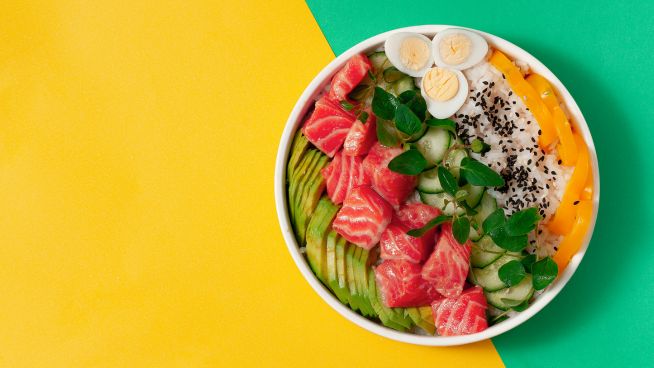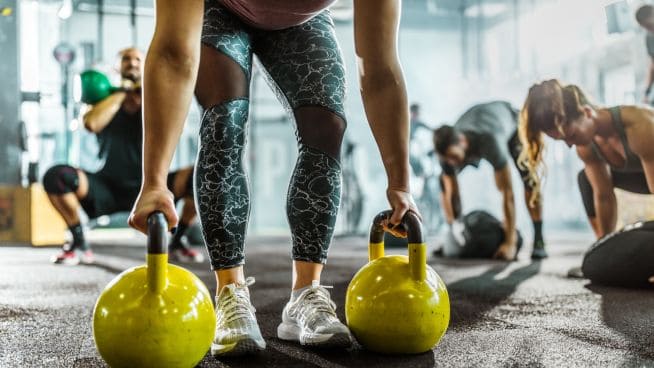Key Nutrients for Athletes

The Power of Protein
Protein is a combination of 20 amino acids that the body uses to rebuild and regenerate muscle. Whey protein makes up 20 percent of the protein found in milk, and because it’s easily digested and absorbed by the body, it’s the type commonly found in post-workout supplements and shakes.
After a workout or game, your muscles are broken down from stress and fatigue and need immediate help to recover. Dr. Kim Stein, GSSI scientist, says, “Protein helps repair damaged muscle tissue as well as adapt [your body] to the demands of training.” Taking in protein after workouts or games helps muscles rebuild bigger and stronger.
Cleveland Browns RB Trent Richardson says, “It is always going to be in my head, ‘okay, I just got a good workout in, I got to get something inside of me.’ I eat a lot of grilled and baked chicken and a lot of good carbs, too.”
Take in high-quality protein (about 20 grams) and carbs within 30 minutes after training to make sure you’re taking advantage of the body’s post-workout recovery window. Your muscles will soak up nutrients like a sponge during this period. Athletes also need protein throughout the day. Take in a steady supply of amino acids to give your body the nutrients it needs to build strong, lean muscle.
There’s a limit to how much protein your body can use; any excess protein is stored as fat. According to Stein, daily protein needs are calculated based on body weight. She says, “Athletes should consume approximately .7 grams of protein per pound of body weight each day.” So, if you are a 180-pound athlete, you need to eat approximately 126 grams of protein per day.
The Role of Fat
Healthy fats from foods like olive oil, nuts and milk—called monounsaturated and polyunsaturated fats— should be a part of every athlete’s diet. GSSI scientist Kim Stein says, “Athletes should make sure they get 20 to 25 percent of their daily calories from fat.”
Fat prevents the breakdown of muscle protein, provides energy and plays a role in other critical bodily functions. It also packs nine calories per gram, compared to only four from carbs and protein.
The American Heart Association recommends limiting foods high in saturated fats—like butter and bacon—to less than seven percent of daily calories, and eliminating trans fats completely.
Carbohydrates: The Athlete’s Fuel Source
Young athletes who cut carbs in an effort to get lean are making a mistake. Carbohydrates are the primary energy source for fueling athletic performance. Found in bread, pasta, fruits and starchy vegetables, “carbohydrates provide energy to help fuel your body so you can go hard longer, without hitting the wall,” says GSSI scientist Lindsay Baker. Once you hit that wall, your body will start breaking down muscle for fuel.
Right before a workout or game, your body is primed to break down fast-digesting sugars for fuel. Topping off muscle energy stores prior to activity ensures that you’ll be ready to perform at your peak. “Right before activity, it’s really good to get in a little extra carbohydrate,” says Dr. Stein. “It doesn’t have to be a lot, about 100 calories (25 grams) or so.” You can get that from a Gatorade Prime, a medium apple or a banana.
Make sure to limit sugar intake outside of training. Try to get 50 to 60 percent of your daily calories from nutrient-dense carbs. Foods like brown rice and whole-wheat bread provide vitamins and nutrients as well as a source of energy.
Power your performance by checking out the full STACK Fueling Guide.
Photo: Stansrestaurant.us
RECOMMENDED FOR YOU
MOST POPULAR
Key Nutrients for Athletes

The Power of Protein
Protein is a combination of 20 amino acids that the body uses to rebuild and regenerate muscle. Whey protein makes up 20 percent of the protein found in milk, and because it’s easily digested and absorbed by the body, it’s the type commonly found in post-workout supplements and shakes.
After a workout or game, your muscles are broken down from stress and fatigue and need immediate help to recover. Dr. Kim Stein, GSSI scientist, says, “Protein helps repair damaged muscle tissue as well as adapt [your body] to the demands of training.” Taking in protein after workouts or games helps muscles rebuild bigger and stronger.
Cleveland Browns RB Trent Richardson says, “It is always going to be in my head, ‘okay, I just got a good workout in, I got to get something inside of me.’ I eat a lot of grilled and baked chicken and a lot of good carbs, too.”
Take in high-quality protein (about 20 grams) and carbs within 30 minutes after training to make sure you’re taking advantage of the body’s post-workout recovery window. Your muscles will soak up nutrients like a sponge during this period. Athletes also need protein throughout the day. Take in a steady supply of amino acids to give your body the nutrients it needs to build strong, lean muscle.
There’s a limit to how much protein your body can use; any excess protein is stored as fat. According to Stein, daily protein needs are calculated based on body weight. She says, “Athletes should consume approximately .7 grams of protein per pound of body weight each day.” So, if you are a 180-pound athlete, you need to eat approximately 126 grams of protein per day.
The Role of Fat
Healthy fats from foods like olive oil, nuts and milk—called monounsaturated and polyunsaturated fats— should be a part of every athlete’s diet. GSSI scientist Kim Stein says, “Athletes should make sure they get 20 to 25 percent of their daily calories from fat.”
Fat prevents the breakdown of muscle protein, provides energy and plays a role in other critical bodily functions. It also packs nine calories per gram, compared to only four from carbs and protein.
The American Heart Association recommends limiting foods high in saturated fats—like butter and bacon—to less than seven percent of daily calories, and eliminating trans fats completely.
Carbohydrates: The Athlete’s Fuel Source
Young athletes who cut carbs in an effort to get lean are making a mistake. Carbohydrates are the primary energy source for fueling athletic performance. Found in bread, pasta, fruits and starchy vegetables, “carbohydrates provide energy to help fuel your body so you can go hard longer, without hitting the wall,” says GSSI scientist Lindsay Baker. Once you hit that wall, your body will start breaking down muscle for fuel.
Right before a workout or game, your body is primed to break down fast-digesting sugars for fuel. Topping off muscle energy stores prior to activity ensures that you’ll be ready to perform at your peak. “Right before activity, it’s really good to get in a little extra carbohydrate,” says Dr. Stein. “It doesn’t have to be a lot, about 100 calories (25 grams) or so.” You can get that from a Gatorade Prime, a medium apple or a banana.
Make sure to limit sugar intake outside of training. Try to get 50 to 60 percent of your daily calories from nutrient-dense carbs. Foods like brown rice and whole-wheat bread provide vitamins and nutrients as well as a source of energy.
Power your performance by checking out the full STACK Fueling Guide.
Photo: Stansrestaurant.us













